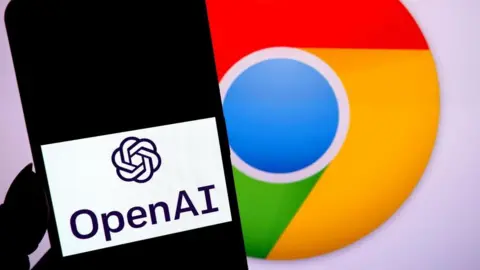Recently, an executive from OpenAI, the maker of ChatGPT, made headlines by expressing interest in acquiring Google Chrome, particularly if Google were to be compelled to sell the popular web browser. This assertion came during a testimony by Nick Turley in a pivotal monopoly trial concerning Google, held in Washington D.C. The U.S. government is attempting to break up Google, citing its overwhelming control over the online search market. Though Chrome has an estimated user base of 64% among internet users, the tech giant has firmly responded, stating that Chrome is not for sale and requesting that the antitrust lawsuit be dismissed.
The ongoing legal battle is part of a broader investigation by the U.S. Department of Justice (DOJ), which has taken multiple actions against major tech companies, focusing on antitrust issues across various mediums, including social media and artificial intelligence. Recently, courts ruled that Google possesses monopolistic power in online searches and advertising technology. In response to these accusations, Google announced its plans to appeal the decisions, promoting the notion that the government’s demands could disrupt consumer interests, economic stability, and the country’s standing in technological advancements, as articulated by Lee-Anne Mulholland, Google’s head of regulatory affairs.
As the trial unfolds, it strategically addresses remedies designed to mitigate Google’s dominance in search engines. The proliferation of generative AI services, such as ChatGPT, has highlighted the potential for new competitors in the market. These advanced AI models enhance search results, helping to minimize misinformation—a known challenge within developing chatbot technologies. Notably, Turley recounted an offer made by OpenAI to Google last year to incorporate Google search results into ChatGPT, which was ultimately rejected by the tech giant. This lack of partnership positions OpenAI on different grounds than its competitor, with the notable alliance it has forged with Microsoft, which operates the Bing search engine and the Edge browser.
In contrast, Google has not stalled its development endeavors, creating its own generative AI products such as Gemini, aimed squarely at taking on ChatGPT. The trial is projected to last three weeks and is being watched closely by other prominent tech firms, including Meta, Amazon, and Apple, all of which are also facing their own scrutiny from the DOJ regarding monopoly concerns.
In more recent developments, OpenAI is reportedly exploring the possibility of launching a social networking platform resembling Twitter, known as X. This speculative initiative, still in its early stages, is being approached with care as company executives, including CEO Sam Altman, solicit feedback for this potential competitor to X, where its own AI tool, Grok, is integrated.
Interestingly, Altman and Elon Musk, the owner of X, were once partners in business until a significant fallout regarding the strategic direction of OpenAI became evident. As the trial concerning Google progresses, it poses significant implications for both the competitive landscape of technology and the ongoing discussions about regulatory responsibilities in ensuring fair competition within the industry. With the trial being one of the most watched legal cases in the tech sector, both OpenAI’s ambitions and Google’s defense strategies will shape the future dialogues surrounding artificial intelligence and big tech laws.



